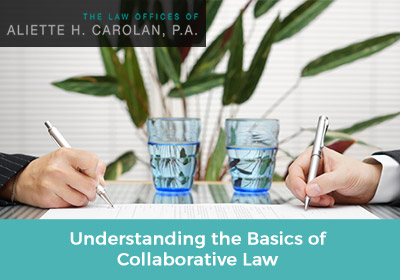 Nearly half of all marriages end in divorce, and Florida is home to one of the highest divorce rates in the nation. Going through a divorce, even under the best of circumstances, is difficult. Dividing assets and ironing out child custody details is often a major source of contention for divorcing couples. And once the arguring starts, it may seem like a mutually amicable agreement is completely out of reach. If you and your ex-spouse are having difficulties agreeing on child custody, alimony, or property division, you may want to consider a collaborative divorce.
Nearly half of all marriages end in divorce, and Florida is home to one of the highest divorce rates in the nation. Going through a divorce, even under the best of circumstances, is difficult. Dividing assets and ironing out child custody details is often a major source of contention for divorcing couples. And once the arguring starts, it may seem like a mutually amicable agreement is completely out of reach. If you and your ex-spouse are having difficulties agreeing on child custody, alimony, or property division, you may want to consider a collaborative divorce.
What Is Collaborative Divorce?
Collaborative law uses a team approach to resolve conflicts and work through disagreements. Through mediation and negotiation, both parties are able to maintain control over their future, while avoiding the courtroom all together. By working together to reach a mutual agreement, divorcing couples can save time and money, without the stress and publicity of litigation.
Collaborative divorces are:
- Cost effective
- Informal
- Efficient
- Focused on problem solving
- Private
How Does Collaborative Divorce Work?
During a collaborative divorce, both parties must retain separate attorneys. When selecting a divorce attorney to represent you, it is important to choose someone who has experience and success mediating and negotiating divorce settlements. While there is some degree of compromise in a collaborative divorce, it is important that your attorney understand all of your wants and needs before the negotiation process begins. Be upfront and honest with your attorney from the start, so they can help you navigate these waters more efficiently.
Once you choose a divorce attorney, you and your lawyer will attend a “four-way meeting” with your ex-spouse and their legal council. These meetings will occur on a regular basis as you negotiate your divorce and agree on settlement terms. During this time, child support specialists, accountants, and other family law professionals may be consulted to help you attain more favorable results. Your attorney will guide you through these negotiations and ensure that your rights are protected throughout the process.
If problems arise during negotiations and a divorce agreement cannot be reached, a licensed mediator may be brought in to help facilitate the process. Mediators are skilled legal professionals who use a strategic approache to guide divorcing parties towards an amicable agreement. If an agreement still cannot be reached, then your divorce may need continue to litigation in court.
Contact Our Miami Family Lawyers Today
If you are considering divorce, it is always advantageous to settle your differences amicably. Through the collaborative divorce process, you and your ex-spouse can work together to make decisions that are best for your family. Collaborative divorce is not for everyone, however. To learn more about divorce options, the Miami family lawyers at the Carolan Family Law Firm, P.A. are here to help. Contact us today at (305) 358-2330 or fill out our confidential contact form and someone will get right back to you.
